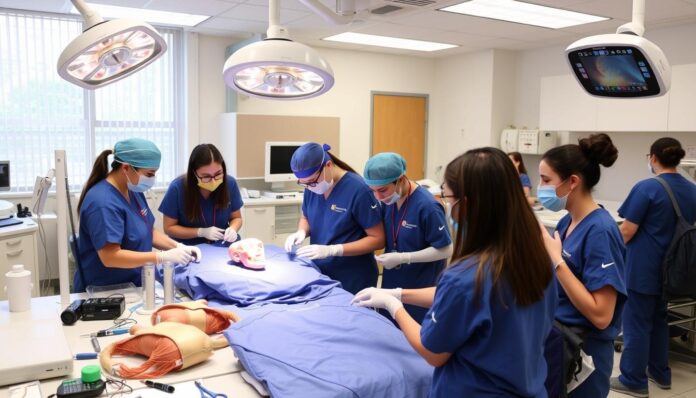Becoming a surgical technologist is an exciting career path in the medical field. The duration of the journey varies depending on your chosen educational pathway.
Surgical techs play a vital role in supporting surgeons during procedures. They ensure operations run smoothly and efficiently.
A vibrant classroom scene with students engaging in hands-on surgical technology training featuring medical instruments, anatomy models, and a high-tech simulation lab showcasing teamwork and learning in a healthcare environment.
Let’s explore the educational options for aspiring surgical techs. We’ll look at program durations and factors affecting the timeline.
Understanding these requirements will help you plan your career path and give you insight into the time needed to become a surgical tech.
Overview of Surgical Technology Education
Surgical technology is crucial in the operating room. Surgical techs help ensure smooth surgical procedures.
They work with surgeons, nurses, and other healthcare team members. Their support is vital during operations.
Surgical techs prepare the operating room and sterilize equipment. They position patients and hand instruments to surgeons.
These professionals need to know medical terms and human anatomy. They must understand surgical procedures to do their job well.
Surgical tech education includes certificate programs, diplomas, and associate’s degrees. These programs usually take 1-2 years to finish.
Students learn medical terms, anatomy, and sterilization techniques. Hands-on training in operating rooms is a key part of learning.
Typical Educational Pathways
Surgical techs have many options for starting their careers. These include certificate programs, associate degrees, and bachelor’s degrees in surgical technology.
Certificate programs last 9 to 12 months. They teach basic skills to surgical techs.
Certificate holders may have fewer chances to move up. This is compared to those with higher degrees.
Associate degree programs take about two years. They cover more theory and practice in surgical technology.
These graduates may get better jobs and pay. This is compared to those with certificates.
Bachelor’s degree programs last 4 years. They teach advanced topics in surgery and patient care.
Graduates with bachelor’s degrees are often more competitive. They may have more job options.
All surgical techs must finish the required coursework. They also need clinical rotations and certification.
These steps help them become qualified professionals. The field of surgical technology is constantly changing.
Duration of Various Programs
Surgical technologist programs are available in different lengths. Certificate programs usually take 9 to 12 months to complete and teach essential skills for the job.
Associate degree programs last about two years. Students learn more about surgical procedures and patient care.
Bachelor’s degree programs take 4 years to complete. They cover technical skills and broader healthcare topics.
The program length is key for future surgical technologists. Each option prepares students for excellent patient care in the operating room.
Factors Influencing Time to Become a Surgical Tech
The time to become a surgical tech varies. Educational program format is a key factor.
Accelerated programs suit students with healthcare experience. These can be finished in 12-18 months.
Traditional full-time programs typically take about two years. Prior education and experience can speed up the process.
Students with relevant prerequisites may finish faster. Healthcare workers may transfer credits, shortening their study time.
A dynamic classroom setting with enthusiastic students engaged in hands-on surgical tech training, featuring advanced medical equipment and anatomy models, bright overhead lights illuminating the scene, a sense of urgency and focus in the environment, sleek and modern design elements, emphasizing accelerated learning and skill acquisition.
Online or hybrid learning options offer flexibility. These allow students to balance studies with other commitments.
Hands-on clinical training remains crucial. Even online programs include in-person labs or clinical sessions.
Certification Requirements
Surgical technologists need special training and certification. They must complete an accredited program that takes 1-2 years.
Graduates can take the Certified Surgical Technologist (CST) exam, administered by the National Board of Surgical Technology and Surgical Assisting (NBSTSA).
The CST exam covers many topics. These include surgical procedures, aseptic techniques, and medical terms.
Passing this exam is key for surgical techs. It shows their skills and helps them get jobs.
Surgical techs need ongoing education to keep their CST certification. This keeps them up-to-date with new methods and best practices.
The CST credential is vital for surgical techs. It proves their skills and knowledge in patient care.
Job Market and Demand
Surgical technology careers offer promising job prospects. The Bureau of Labor Statistics projects a 9% employment growth from 2021 to 2031.
An aging population and medical advancements drive this growth. The need for surgical services is expected to rise.
New surgical techniques have expanded the role of surgical technologists. Healthcare facilities seek qualified individuals to assist in complex procedures.
Surgical techs can work in hospitals, surgical centers, and outpatient facilities, and job seekers can expect competitive salaries and various employment options.
A career in surgical technology contributes to patient well-being and helps advance medical care in a dynamic field.

Skills Needed to Succeed
Surgical techs need special skills to do well. They must know sterile methods and how to use medical tools.
They also need to work well with complex equipment. Keeping the work area clean is very important.
Good surgical techs pay close attention to details. They think fast and stay calm when things get busy.
They guess what the surgical team needs before they ask. This helps the surgery go smoothly.
Talking clearly with doctors and patients is key. Following orders exactly is also significant.
Being kind and caring helps surgical techs give excellent care. They must also have strong ethics.
Job Responsibilities of a Surgical Tech
Surgical techs are vital in healthcare. They ensure smooth medical procedures in operating rooms.
These professionals handle tasks before, during, and after surgery. Their work helps prevent infections and complications.
Before surgery, techs prepare the operating room. They sterilize tools and set up the surgical table.
Techs also help position the patient. This creates a clean, organized space for surgery.
During surgery, techs support doctors and nurses. They hand over tools and watch the patient’s condition.
Techs anticipate surgeons’ needs. This keeps the surgery flowing smoothly.
After surgery, techs clean the room. They restock supplies for the following procedure.
Techs may help move patients to recovery. They also keep detailed records of the surgery.
Surgical techs need many skills. These include technical know-how and attention to detail.
They must work well under pressure. Their efforts help surgeries succeed and patients recover.
Conclusion: Is Becoming a Surgical Tech Right for You?
Surgical tech careers can be rewarding and in demand. You’ll play a vital role in patient care with diverse educational options.
This job suits those who like fast-paced, hands-on work. Strong attention to detail and teamwork skills are essential.
The training is thorough, but job prospects are bright. Growth is expected in the coming years.
Your choice should match your interests and goals. Consider the pros and cons carefully.
Understand the education and certification needs. This will help you make a wise decision.
A surgical tech career path can lead to success. Choose surgical technology as a profession if it fits your aspirations.
FAQ
How long does it take to become a surgical tech?
Becoming a surgical tech takes 9-12 months for certificate programs. Associate degrees take 2 years, while bachelor’s degrees require 4 years.
What are the typical educational pathways for becoming a surgical tech?
Surgical techs can choose from certificate, associate, or bachelor’s degree programs. Each option provides the needed training for operating room work.
What factors can influence the time it takes to become a surgical tech?
Program format, prior education, and specific program requirements affect the time to become a surgical tech. Full-time, part-time, or online options may change the timeline.
What are the certification requirements for surgical techs?
Surgical techs need certification from the NBSTSA or similar accredited organizations. Ongoing education is required to keep accreditation and stay current with new techniques.
What is the job outlook for surgical techs?
The job outlook for surgical techs is positive. The Bureau of Labor Statistics projects faster-than-average growth for this profession.
What skills are needed to succeed as a surgical tech?
Surgical techs need both technical and soft skills to succeed. These include sterilization procedures, instrument use, attention to detail, and teamwork abilities.
What are the typical job responsibilities of a surgical tech?
Surgical techs have key roles in all phases of surgery. They prepare the operating room, assist the team, and maintain a sterile environment.
You can also read more : How Many Years of School to Be a Vet Tech – Duration Guide



